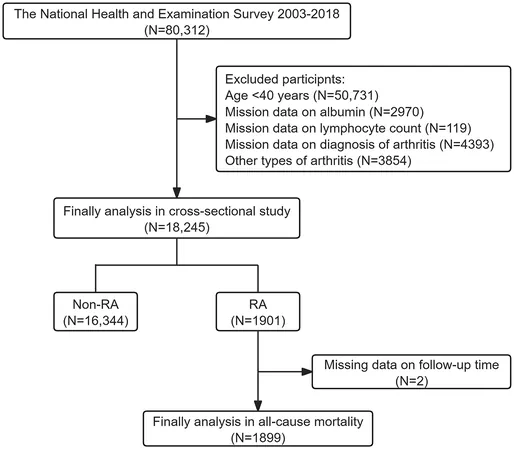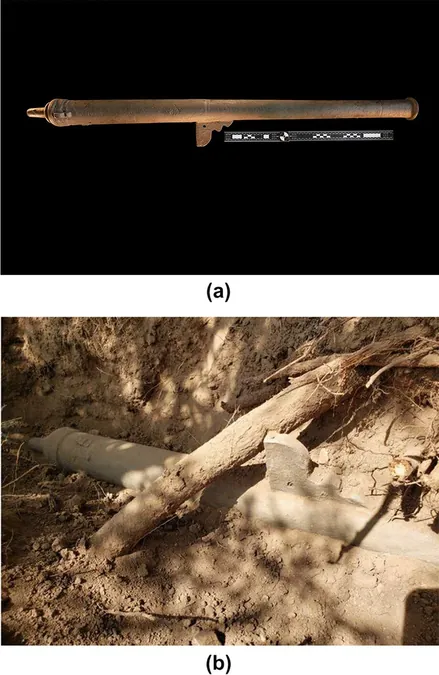
Uncovering the Hidden Link Between Prognostic Nutritional Index and Rheumatoid Arthritis Risks: What Every Adult Over 40 Needs to Know!
2024-11-26
Author: Sarah
Introduction
Rheumatoid arthritis (RA) is a chronic autoimmune disease affecting around 1% of adults globally, with its prevalence increasing sharply in individuals aged 40 and above. The disease is not just a minor inconvenience; it poses significant health risks, including severe joint damage, cardiovascular disease, and psychological distress, ultimately leading to reduced quality of life and early mortality. Recent research suggests an intriguing association between the prognostic nutritional index (PNI) — a measure of immune and nutritional status — and the presence and mortality of RA.
What is the Prognostic Nutritional Index (PNI)?
PNI is calculated using serum albumin levels and lymphocyte counts, originally developed to gauge health outcomes, especially in cancer patients. It serves as a marker of an individual's nutritional state and immune competency, indicating that higher PNI values may correlate with better health outcomes.
Latest Findings from NHANES Data: A Groundbreaking Study
A recent study leveraging the National Health and Nutrition Examination Survey (NHANES) data from 2003 to 2018 involved over 18,000 participants aged 40 and older. Out of these, 1,901 individuals were diagnosed with RA. The findings revealed that a higher PNI was inversely associated with the likelihood of developing RA and all-cause mortality among those diagnosed with the disease.
The study highlighted several key takeaways: - **Inverse Association**: Higher PNI lowered the risk of having RA, suggesting individuals with better nutritional and immune status had fewer cases of this debilitating disease. - **Mortality Link**: Those RA patients with higher PNI showed a 34-51% reduced risk of all-cause mortality in contrast to those in the lowest PNI quartile. - **L-shaped Relationship**: Interestingly, the study identified an L-shaped curve linking PNI with both the incidence and mortality rates of RA. This suggests that while maintaining a PNI above a certain threshold can have significant health benefits, improvements beyond that threshold may not yield further protective effects.
Why Should You Care?
As the population ages, understanding the relationship between nutritional status and chronic diseases like RA becomes paramount. The implications for public health are vast, underscoring the need for proactive dietary management and regular health check-ups, especially for individuals over 40.
Real-World Implications of This Research
This research opens new doors in the diagnosis and management of RA, emphasizing that both nutritional and immune factors are crucial players in understanding the disease's pathogenesis. Here are practical takeaways for those at risk: 1. **Diet Matters**: A balanced diet rich in anti-inflammatory foods can boost your PNI and overall immunity. 2. **Regular Check-ups**: Especially for adults over 40, regular monitoring of health markers, including albumin and lymphocyte counts, could provide early warnings for RA. 3. **Move More, Stress Less**: Engaging in regular physical activity can help maintain a healthy PNI and combat both inflammation and depression associated with RA.
Conclusion
The connection between PNI and rheumatoid arthritis mortality and prevalence sheds light on the significant role nutrition plays in managing chronic diseases. It calls for increased awareness and actions to enhance nutritional status, marking a potential shift in how we approach the prevention and management of rheumatoid arthritis. Now, more than ever, it’s crucial to prioritize your health and make informed lifestyle choices!
Will You Take Charge of Your Health?
Don’t let RA define your later years — take steps today towards a healthier, fulfilling life!



 Brasil (PT)
Brasil (PT)
 Canada (EN)
Canada (EN)
 Chile (ES)
Chile (ES)
 España (ES)
España (ES)
 France (FR)
France (FR)
 Hong Kong (EN)
Hong Kong (EN)
 Italia (IT)
Italia (IT)
 日本 (JA)
日本 (JA)
 Magyarország (HU)
Magyarország (HU)
 Norge (NO)
Norge (NO)
 Polska (PL)
Polska (PL)
 Schweiz (DE)
Schweiz (DE)
 Singapore (EN)
Singapore (EN)
 Sverige (SV)
Sverige (SV)
 Suomi (FI)
Suomi (FI)
 Türkiye (TR)
Türkiye (TR)